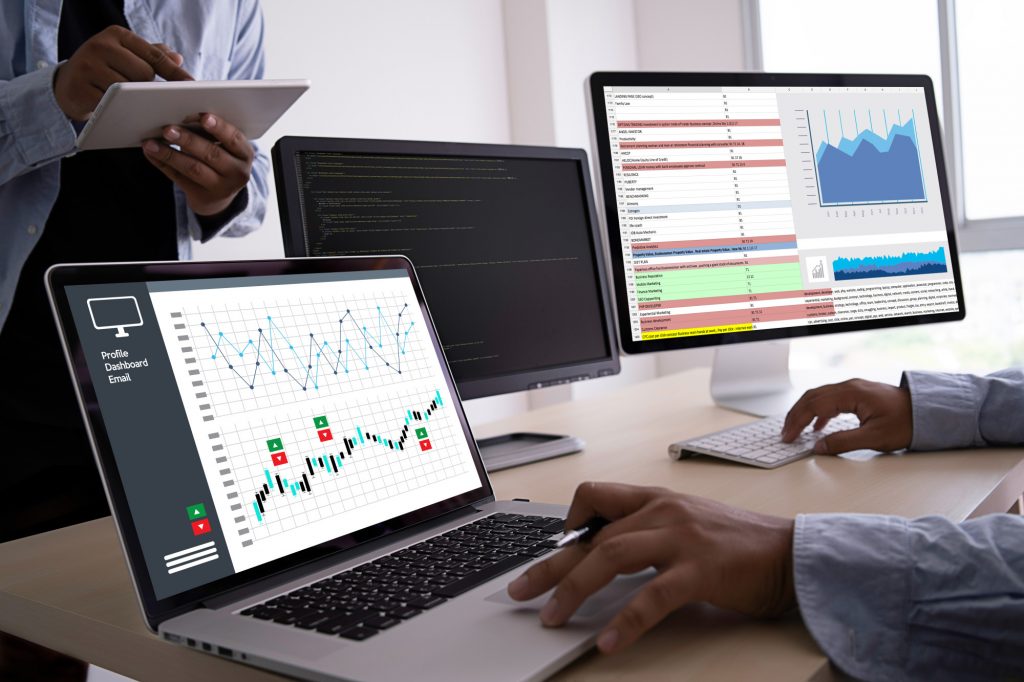
What if you knew the future of your business?
Well, you can. Sort of. With the right data analytics tools, you can pick out customer trends and predict their behavior down the road.
By using certain algorithms, you can pick what you’re looking for out of a sea of data. For example, maybe you want to see how long customers spend looking at a particular product page on your website, or how many customers are local vs. out of town. All of this information is waiting for you if you’re willing to extract it.
Let’s look at the benefits of using big data analytics as part of your business practices. But first…
What Are Data Analytics Tools?
“Big data” is a term that has emerged fairly recently in the world of business. It looks at raw data as a whole and uses advanced analytics to answer particular questions or help business owners make key decisions.
Traditionally, businesses can judge where they’re going by where they’ve been, to a certain extent. Advanced analytics can allow more accurate predictions and allows a business owner to respond to changes as they happen. In short, there’s an ocean of data to sift through, and these tools make it easier for the average person to pull the useful information from it.
In the past, doing this kind of work required a special set of skills to mine out useful results. It was left to IT departments and data scientists. Read more about data science here.
But as data analytics tools evolved, there are now self-serve data preparation solutions that almost anyone can use.
These analytics tools can provide insight into any area of business operations. For example, if a company wants to know how many people to hire for a particular purpose, they can rake through data to determine the need for additional support. Then they can even use data to find the best job candidates.
Find Out What Customers are Likely to Buy
Analytics tools can help you determine what demographic buys certain items. For example, perhaps some customers buy similar items each time they shop at your business.
If you have a physical store, this data can help you better organize it so items that are frequently bought together can be side by side. If you’re selling online, it’s an opportunity to put those products in front of the customer as they’re browsing in the form of “you might also be interested in these products…”.
Provide More Personalized Service
By accurately tracking customer behavior, you can get to know a customer better even if you never make face-to-face contact. You can use their name throughout communications, and show them new products they might be interested in based on their purchase history.
This can also assist in tailoring special offers for that customer that are unique to the types of products and services they would be interested in. Personalized experiences can result in customers spending more than they intended to.
Better Manage Your Inventory
Buying too much stock for sale or not having enough can negatively impact your business or the customer. If you have too much, you may not be able to sell it and you end up taking a hit. If you don’t have the right products when your customers want them, you risk losing them to a competitor.
By analyzing this kind of data, you can determine which products are selling and if the demand for them is growing. That way you can be sure you have the appropriate amount of inventory to convert sales without the customer waiting a long time for their purchase.
Improve Curation of Your Product Offerings
Big data can tell you which of your products are selling well, true. But they can also tell you which ones are the lowest-performing and which are getting negative feedback or refunds from clients.
With this information, you can drop products that are not selling quickly. You can also identify problem suppliers. You may also be able to use this information to help you develop new products that are likely to sell based on customer preferences.
Effectively Deter Fraud
Not only can analytics drive more sales, but it can also help reduce any losses through fraudulent behavior. Big data can provide insight into unusual behaviors so you can guard against them as they’re happening.
Using data can also help guard your business against cyber attacks, which can disrupt operations and end up costing business owners a lot of money. How much? More than $650 billion in 2018 alone. Using analytics can also help protect your customer data, which is important in building trust.
Improve Your Brand Reputation
Big data can reveal customer feedback and gauge whether customers are happy with their experience. This can be achieved through sentiment analysis (or opinion mining as it’s also known) that is what it sounds like: it studies the emotional reactions from your audience to your online marketing.
By determining what people are thinking and feeling, you can start to make the appropriate adjustments to improve your brand reputation.
Improve Your Advertising Spending
You can determine through data which ads people are clicking on and which ones are converting into sales. Using this information, you can better decide what messaging works well for sales and where customers are seeing the ads – for example, a social media campaign.
Once you know what works, you can funnel more ad dollars into it and cut other methods that aren’t showing results.
Embrace Big Data
Using data analytics tools can help you gain an edge over a competitor offering the same products and services. By knowing the behavior of your customers, your suppliers, and even your staff, you can better position yourself to cut costs, boost sales and increase your return on investment.
Meanwhile, visit our site to find out more about improving your brand reputation and boosting your search engine ranking.

